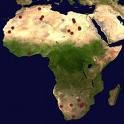Africa’s “Resource Wars” Assume Epidemic Proportions

A civil war in Congo may cause big problems for millions of cell phone and computer users across the globe.
Congo is the world’s third largest producer of tantalum used in high-tech electronics. Even a temporary supply shortage may deal a serious blow to the electronics industry with far-reaching consequences for other branches. The situation in Congo is just one example of how regional conflicts may affect the lives of millions of people on other continents.
Although sparked by a tribal and clan feud, the ongoing bloodshed in that Central African country is actually a war for mineral resources. This week, the rebels seized Goma, the biggest city in the mineral-reach eastern part of Congo, and are poised to fight on with government troops and UN forces unable, so far, to check their advance. The rebels, who call themselves the March 23 Movement, or M23, are widely believed to enjoy clandestine support from neighboring Rwanda and Uganda struggling for access to Congo’s mineral wealth.
Congo has vast and largely untapped reserves of oil, gold, diamonds, copper, uranium, cobalt and other minerals, including tantalum – a rare-earth metal used in the nuclear power industry, mobile phones, computers, digital cameras and other high-tech products. With demand for tantalum growing faster than supply, fueled by rapidly-developing high-tech branches, tantalum is becoming more profitable than gold or diamonds. For Congo’s poor neighbors, control over tantalum deposits could mean a chance for an economic breakthrough and higher living standards. And although producers have stockpiled sufficient quantities of tantalum, the situation is very alarming and prompting scientists to look for alternatives.
Analysts draw parallels with Serbia and the Balkan conflict. A Western project for the independence of Kosovo intended not only to punish the disobedient Serbia, but also to strip it of a vast portion of mineral reserves – coal, gold, platinum, bauxites, zinc, nickel and cobalt – estimated at dozens of millions of tons. Cobalt, for example, is a key element in renewable energy production.
The recent bloody war in Sudan is seen by some experts as a battlefield between Beijing and Washington. China has invested and continues to invest billions of dollars in Africa and made it a priority of its foreign policy. As a result of the war, Sudan split into two separate states – Sudan and South Sudan. Last year, the oil-rich South Sudan acquired independence with the active assistance of the United States. But the Sudanese oil, though extracted in the south, cannot be transported other than through the north, which makes oil transit an essential issue with many lances broken over it already.
As the global population grows at a rate of tens of millions per year, the task of providing it with energy and staple goods is becoming a top priority. While for many countries, control over mineral resources is actually a matter of surviving, for elites it’s an opportunity to enrich themselves uncontrollably. Wars for resources may assume epidemic proportions.
Stop NATO e-mail list home page with archives and search engine:
http://groups. yahoo.com/ group/stopnato/ messages
Stop NATO website and articles:
http://rickrozoff. wordpress. com

